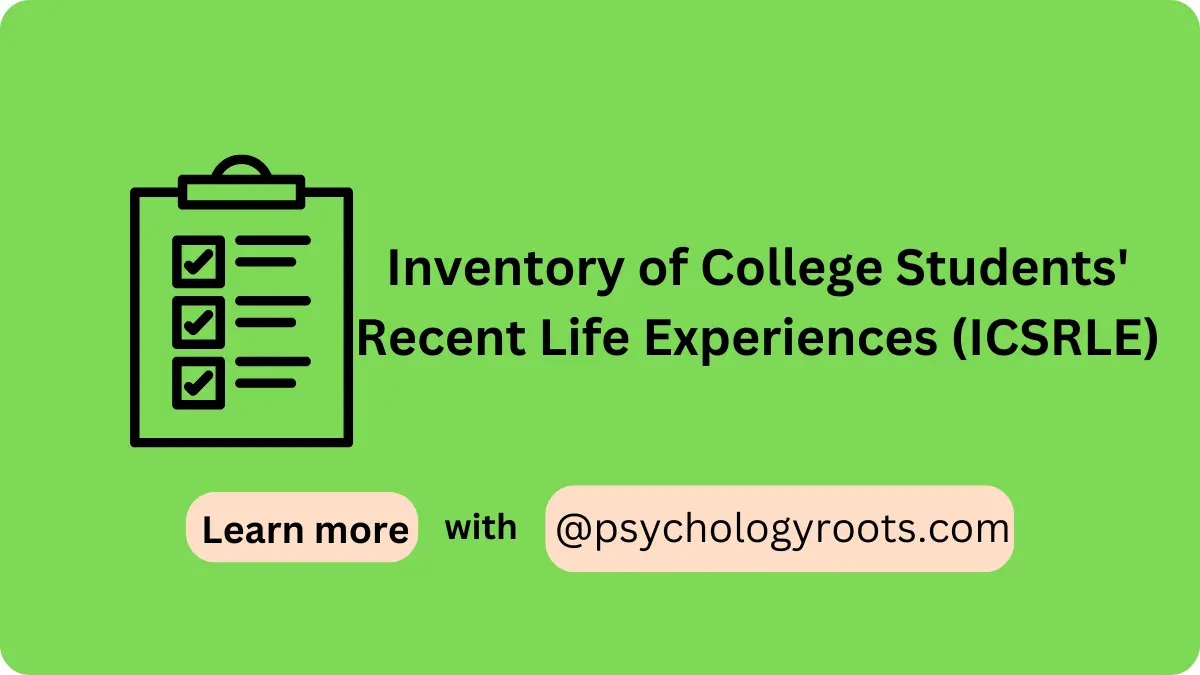Table of Contents
Inventory of College Students’ Recent Life Experiences (ICSRLE)
Here in this post, we are sharing the “Inventory of College Students’ Recent Life Experiences (ICSRLE)”. You can read psychometric and Author information. We have thousands of Scales and questionnaires in our collection (See Scales and Questionnaires). You can demand us any scale and questionnaires related to psychology through our community, and we will provide you with a short time. Keep visiting Psychology Roots.
About Inventory of College Students’ Recent Life Experiences (ICSRLE)
Scale Name
Inventory of College Students’ Recent Life Experiences (ICSRLE)
Author Details
Kohn, P. M., Lafreniere, K., and Gurevich
Translation Availability
English

Background/Description
The Inventory of College Students’ Recent Life Experiences (ICSRLE) is a 49-item scale developed by Kohn, Lafreniere, and Gurevich (1990) to assess the perceived stress levels of college students stemming from recent life experiences and daily hassles. This tool is unique in its focus on stressors that are particularly relevant to the college demographic, addressing experiences within the past month that may impact students’ mental health and academic performance.
The ICSRLE encompasses seven key factors commonly associated with college student stress: Developmental Change (e.g., “Important decisions about your education”), Time Pressure (e.g., “Too many things to do at once”), Academic Alienation (e.g., “Disliking your studies”), Romantic Problems (e.g., “Conflicts with boyfriend/girlfriend/spouse”), Assorted Annoyances (e.g., “Disliking fellow students”), General Social Mistreatment (e.g., “Being ignored”), and Friendship Problems (e.g., “Conflicts with a friend”). Students rate each item using a 4-point Likert scale, where 1 represents “not at all” and 4 signifies “very much.” This structure allows researchers to gauge the intensity of stressors that college students experience, providing insights into areas that may need intervention or support.
Administration, Scoring and Interpretation
- Obtain the Copy: Available through academic journals or psychological resources.
- Purpose: To measure college students’ stress levels based on recent life experiences and daily hassles.
- Instructions: Respondents are asked to rate each item according to their experiences over the past month on a 4-point Likert scale, from “not at all” (1) to “very much” (4).
- Time: Approximately 10–15 minutes.
- Administer the Scale: The scale can be administered individually or in group settings, either online or on paper, with no special requirements.
Reliability and Validity
The ICSRLE demonstrates high reliability, with an internal consistency of α = .89, indicating strong internal reliability across various samples. This reliability underscores its utility for assessing stress levels in college populations. The scale’s factors have been validated through extensive research, confirming that its items effectively represent stressors that are particularly relevant and common among college students.
Available Versions
49-Items
Reference
Kohn, P. M., Lafreniere, K., & Gurevich, M. (1990). The inventory of college students’ recent life experiences: A decontaminated hassles scale for a special population. Journal of behavioral medicine, 13(6), 619-630.
Important Link
Scale File:
Frequently Asked Questions
What does the ICSRLE measure?
It measures perceived stress from recent life experiences specific to college students.
Who can use this scale?
The ICSRLE is primarily intended for college students but can be adapted for young adults in similar settings.
Is the ICSRLE a reliable tool?
Yes, it has a high reliability coefficient (α = .89), indicating consistent results.
How are responses interpreted?
Responses are summed to provide an overall stress score, with higher scores indicating higher levels of perceived stress.
Can it be used to assess mental health in college students?
Yes, as it highlights stress areas that may contribute to mental health challenges among students.
Disclaimer
Please note that Psychology Roots does not have the right to grant permission for the use of any psychological scales or assessments listed on its website. To use any scale or assessment, you must obtain permission directly from the author or translator of the tool. Psychology Roots provides information about various tools and their administration procedures, but it is your responsibility to obtain proper permissions before using any scale or assessment. If you need further information about an author’s contact details, please submit a query to the Psychology Roots team.
Help Us Improve This Article
Have you discovered an inaccuracy? We put out great effort to give accurate and scientifically trustworthy information to our readers. Please notify us if you discover any typographical or grammatical errors.
Make a comment. We acknowledge and appreciate your efforts.
Share With Us
If you have any scale or any material related to psychology kindly share it with us at psychologyroots@gmail.com. We help others on behalf of you.